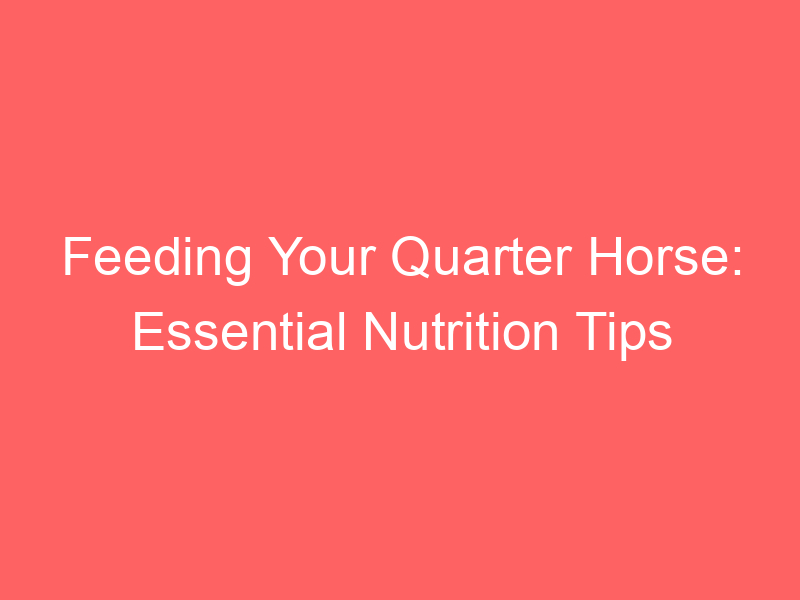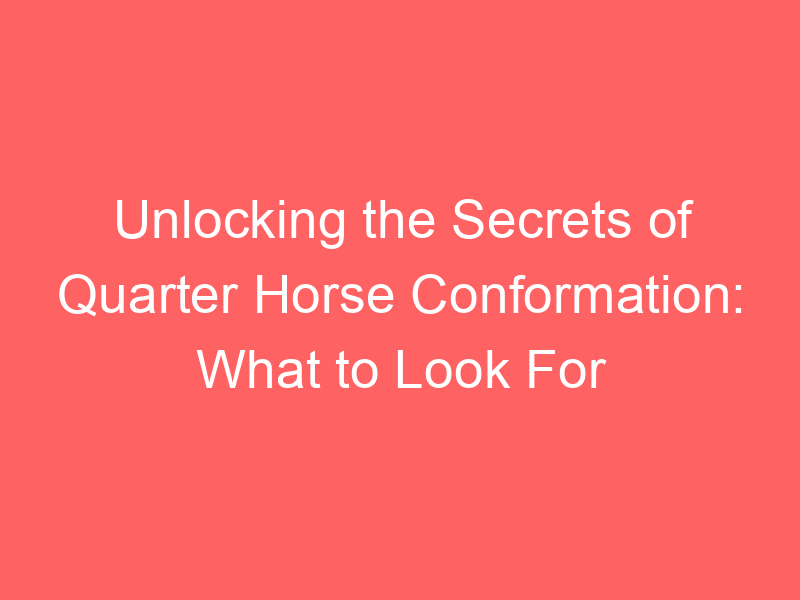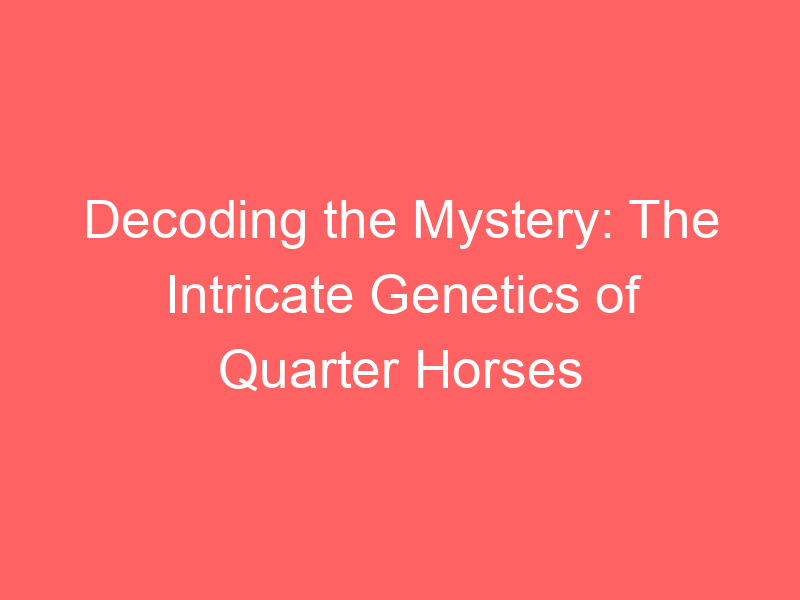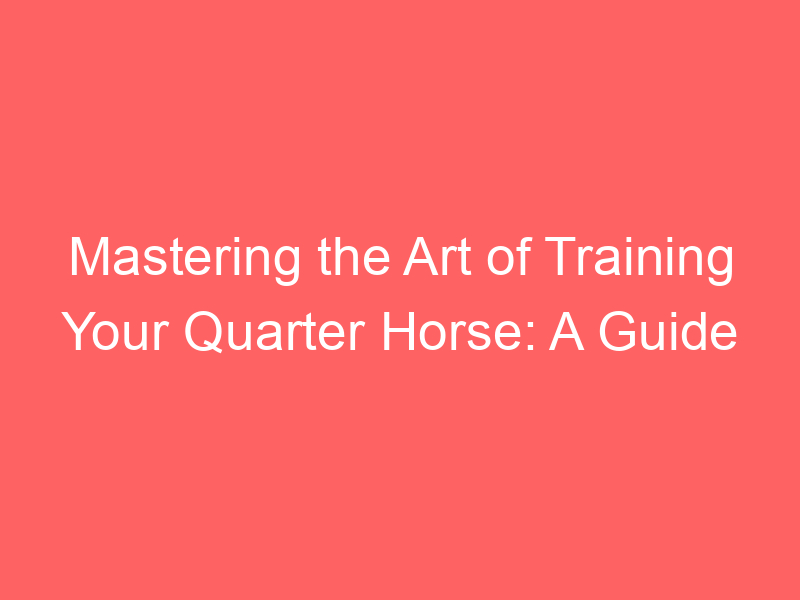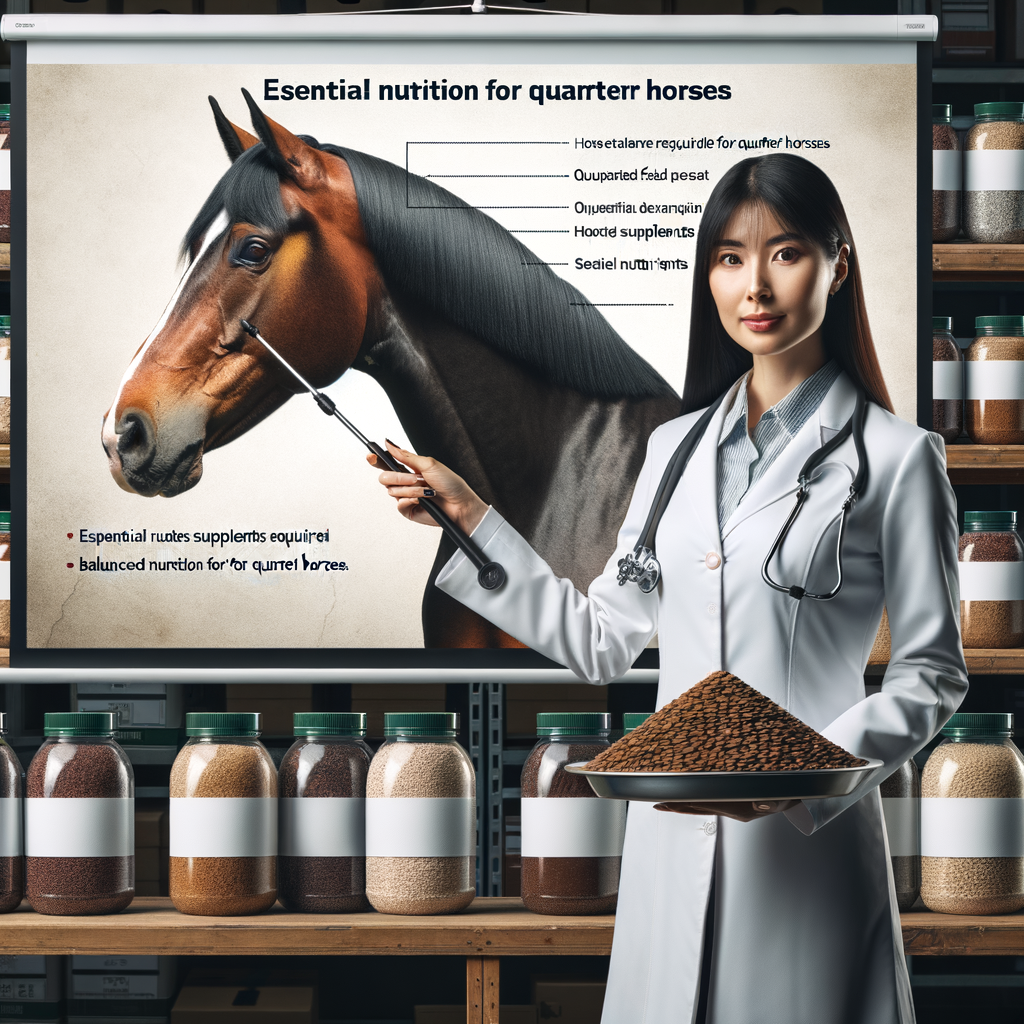
Introduction to Quarter Horse Diet
When it comes to horse care, nutrition plays a pivotal role. This is especially true for Quarter Horses, a breed known for its agility and speed. Understanding their unique dietary needs can help ensure their health and performance. In this section, we will delve into the dietary needs of Quarter Horses and the importance of a balanced diet.
- Understanding the Unique Nutritional Needs of Quarter Horses
- Importance of a Balanced Diet for Horses
Quarter Horses are a versatile breed, participating in a variety of activities such as racing, rodeo events, and working cattle. This variety in activity levels means that their nutritional needs can vary significantly. They require a diet rich in proteins, carbohydrates, vitamins, and minerals to maintain their health and energy levels.
For instance, a Quarter Horse involved in high-intensity activities like racing might require a diet higher in energy-providing nutrients like carbohydrates. On the other hand, a Quarter Horse used for light trail riding might not need as much energy and can do well on a diet lower in these nutrients. Understanding these unique needs is crucial to providing the right diet for your Quarter Horse.
A balanced diet is key to maintaining the overall health and well-being of any horse. It helps to prevent nutritional deficiencies and excesses, both of which can lead to health problems. A balanced diet for a horse should include a mix of forage, grains, and supplements, tailored to the horse’s specific needs.
Forage, such as hay or pasture, should make up the bulk of a horse’s diet. It provides the necessary fiber for a healthy digestive system. Grains can be added to provide additional energy, while supplements can be used to ensure the horse is getting all the necessary vitamins and minerals.
Remember, every horse is unique and what works for one might not work for another. It’s always best to consult with a veterinarian or an equine nutritionist when planning your horse’s diet.
Horse Feeding Guidelines
In this section, we will discuss the general feeding practices that are essential for maintaining the health of your horse. These practices include understanding the right feeding frequency and portion sizes, as well as the importance of providing clean water.
General Feeding Practices
Feeding your horse correctly is a crucial aspect of horse care. It’s not just about what you feed them, but also how and when you feed them. Let’s delve into some of these practices:
- Feeding Frequency and Portion Sizes
- Importance of Clean Water
Horses are grazing animals and their digestive systems are designed to process food in small amounts throughout the day. Therefore, it is recommended to feed your horse multiple small meals rather than one or two large ones. The portion size will depend on the horse’s size, age, and activity level. For example, a mature horse at rest may require about 1.5% to 2% of its body weight in feed per day.
Water is an essential part of a horse’s diet. Horses need access to clean, fresh water at all times, not just during feeding times. On average, a horse may drink between 5 to 10 gallons of water per day, but this can increase in hot weather or with increased activity. Always ensure that your horse’s water source is clean to prevent illnesses and dehydration.
By following these general feeding practices, you can ensure that your horse gets the nutrition it needs to stay healthy and active. Remember, each horse is unique and may require adjustments to their feeding regimen based on their specific needs and lifestyle.
Quarter Horse Specific Guidelines
When it comes to feeding Quarter Horses, there are a couple of specific guidelines to keep in mind. These horses have unique metabolic needs and their activity level can greatly influence their dietary requirements. Let’s delve into these aspects in more detail:
- Understanding the Quarter Horse’s metabolism
Quarter Horses are known for their muscular build and fast sprinting speed. This unique physicality is supported by a distinct metabolic system. Unlike other breeds, Quarter Horses have a higher metabolic rate, meaning they burn energy at a faster pace. This is why they require a diet rich in proteins and carbohydrates to sustain their energy levels.
It’s important to note that overfeeding can lead to obesity, a common issue in Quarter Horses. Therefore, it’s crucial to balance their high-energy diet with regular exercise.
- Adjusting feed based on activity level
The activity level of your Quarter Horse plays a significant role in determining its dietary needs. A horse that is regularly exercised will need more calories to replenish its energy reserves. On the other hand, a horse with a sedentary lifestyle will require fewer calories to prevent weight gain.
For instance, a working Quarter Horse might need up to 20,000 calories a day, while a horse at rest might only need about 15,000 calories. It’s important to adjust the feed quantity and quality based on your horse’s activity level to maintain optimal health.
| Horse Activity Level | Calorie Requirement |
|---|---|
| Working Quarter Horse | Up to 20,000 calories |
| Resting Quarter Horse | About 15,000 calories |
Remember, every horse is unique. It’s always best to consult with a veterinarian or an equine nutritionist to determine the best diet for your Quarter Horse.
Essential Nutrients for Quarter Horses
Understanding the essential nutrients required by Quarter Horses is crucial for their overall health and performance. These nutrients are broadly categorized into macronutrients and micronutrients. In this section, we will delve into the macronutrients, specifically proteins, carbohydrates, and fats, and their significance in equine nutrition.
Macronutrients
Macronutrients are the nutrients that horses need in large amounts. They include proteins, carbohydrates, and fats. Let’s take a closer look at each of these macronutrients and their roles in equine nutrition.
- Role of proteins in equine nutrition
- Importance of carbohydrates and fats
Proteins are vital for the growth, repair, and maintenance of body tissues in Quarter Horses. They are made up of smaller units called amino acids. Amino acids are often referred to as the building blocks of proteins. Horses need 10 essential amino acids in their diet, including lysine, methionine, and threonine. A deficiency in any of these amino acids can lead to poor growth, reduced muscle mass, and impaired immune function.
Carbohydrates are the primary source of energy for horses. They are broken down into glucose, which is used to fuel the horse’s activities. Fats, on the other hand, provide a concentrated source of energy. They are particularly important for endurance activities as they provide more than twice the energy of carbohydrates per gram. Additionally, fats are essential for the absorption of fat-soluble vitamins like Vitamins A, D, E, and K.
In conclusion, proteins, carbohydrates, and fats are all essential macronutrients in a Quarter Horse’s diet. They each play a unique role in supporting the horse’s health and performance. By understanding these roles, you can ensure your horse gets the right balance of nutrients it needs to thrive.
Micronutrients
Just like humans, horses need a balanced diet to stay healthy. This includes not only macronutrients like proteins, carbohydrates, and fats, but also micronutrients. Micronutrients are vitamins and minerals that a horse needs in small amounts. They play a crucial role in a horse’s health and wellbeing. Let’s take a closer look at the vitamins and minerals that are essential for a Quarter Horse’s health.
- Vitamins necessary for Quarter Horse health
Vitamins are organic compounds that a horse’s body needs to function properly. They are essential for growth, digestion, and nerve function. Some of the most important vitamins for a Quarter Horse’s health include:
| Vitamin | Function |
|---|---|
| Vitamin A | Important for vision, growth, and immune function. |
| Vitamin D | Helps the body absorb calcium and phosphorus, which are important for bone health. |
| Vitamin E | Acts as an antioxidant, protecting the body’s cells from damage. |
| Vitamin K | Plays a key role in blood clotting. |
These vitamins are usually found in sufficient amounts in a balanced horse diet. However, in some cases, a horse may need a vitamin supplement.
- Essential minerals in a horse’s diet
Minerals are inorganic substances that a horse’s body needs for various functions. They are important for bone and teeth formation, blood clotting, and muscle contraction. Some of the most important minerals for a Quarter Horse’s health include:
| Mineral | Function |
|---|---|
| Calcium | Important for bone and teeth health, and muscle function. |
| Phosphorus | Works with calcium to maintain bone health. |
| Potassium | Helps with nerve and muscle cell functioning. |
| Sodium | Essential for fluid balance and nerve function. |
These minerals are usually found in sufficient amounts in a balanced horse diet. However, in some cases, a horse may need a mineral supplement.
Horse Feed Recommendations
Feeding your Quarter Horse with the right diet is crucial for its health and performance. In this section, we will discuss the importance of commercial feeds and how to choose the right one for your horse.
Commercial Feeds
Commercial feeds are a convenient and balanced source of nutrients for your Quarter Horse. They come in various forms such as pellets, cubes, and textured feeds. Let’s delve into the key aspects of commercial feeds.
- Understanding feed labels
- Choosing the right feed for your Quarter Horse
Feed labels provide vital information about the nutritional content of the feed. They list the ingredients, guaranteed analysis, feeding directions, and the purpose of the feed. Understanding these labels can help you make an informed decision about what to feed your horse.
Each horse has unique nutritional needs based on its age, weight, activity level, and health status. For instance, a growing foal requires more protein, while an active adult horse needs more energy. Therefore, you should choose a feed that matches your horse’s specific needs. For example, a high-performance feed is suitable for an active horse, while a senior feed is ideal for an older horse. Always consult with your vet or a nutritionist to ensure that your horse’s diet is balanced and appropriate.
In conclusion, commercial feeds can be an excellent source of nutrition for your Quarter Horse if chosen wisely. Always pay attention to the feed labels and consult with a professional when in doubt. Remember, a healthy horse is a happy horse!
Forage and Pasture
Forage and pasture play a crucial role in a Quarter Horse’s diet. Let’s delve into the benefits of grazing and how to choose the right hay for your horse.
- Benefits of Grazing
- Physical Health: Grazing provides horses with necessary nutrients and helps maintain a healthy digestive system.
- Mental Well-being: Horses are herd animals and grazing allows them to socialize, which is good for their mental health.
- Exercise: Grazing also provides horses with a chance to move around and exercise, which is essential for their overall health.
- Choosing the Right Hay for Your Horse
- Quality: Always choose high-quality hay. It should be green, dry, and free from mold and dust.
- Type: The type of hay you choose depends on your horse’s age, health, and activity level. For example, alfalfa hay is high in protein and calcium, making it suitable for young, growing horses or lactating mares.
- Availability: The hay you choose should be readily available in your area. This ensures that your horse’s diet remains consistent.
Grazing is an essential part of a horse’s natural behavior and diet. Here are some benefits:
Choosing the right hay for your horse is equally important. Here are some tips:
In conclusion, forage and pasture are vital components of a Quarter Horse’s diet. Grazing offers numerous benefits, and choosing the right hay is crucial for your horse’s health. Always remember, a well-fed horse is a happy and healthy horse.
Special Considerations in Equine Nutrition
When it comes to equine nutrition, certain situations require special attention. One such scenario is the feeding of a pregnant mare. The nutritional needs during gestation and lactation periods are unique and require careful management.
Feeding the Pregnant Mare
Feeding a pregnant mare is a delicate task that needs to be handled with care. The mare’s nutritional needs change significantly during gestation and lactation. Let’s explore these aspects in detail.
- Nutritional needs during gestation:
- Feeding practices for lactating mares:
In the early stages of pregnancy, a mare’s nutritional needs are similar to those of a non-pregnant mare. However, as the pregnancy progresses, the mare’s energy requirements increase. By the last three months of pregnancy, when the foal is growing rapidly, the mare may need up to 20% more energy in her diet. This can be achieved by increasing the amount of high-quality forage and grain in her diet. Protein, vitamins, and minerals are also crucial for the development of the foal.
Once the foal is born and the mare begins to lactate, her nutritional needs increase even further. A lactating mare needs about 50% more energy than a non-lactating mare. This is because producing milk requires a lot of energy. The mare’s diet should be rich in quality protein, calcium, and phosphorus to support milk production. Regular feeding, ideally three to four times a day, can help meet these increased nutritional demands.
In conclusion, feeding a pregnant mare requires careful attention to her changing nutritional needs. By providing a balanced diet that meets these needs, you can help ensure the health of both the mare and her foal.
Feeding the Aging Quarter Horse
As our beloved Quarter Horses age, their nutritional needs change. It’s crucial to adjust their diet to ensure they remain healthy and vibrant. In this section, we will discuss how to adjust the diet for senior horses and deal with common health issues in older horses.
- Adjusting Diet for Senior Horses
Senior horses require a diet that is easy to digest and rich in nutrients. As horses age, their ability to absorb nutrients decreases, and their teeth may become less effective at grinding food. Therefore, their diet should include softer foods, such as beet pulp and hay cubes, which are easier to chew and digest.
It’s also important to increase the protein content in their diet. A senior horse’s diet should contain about 12-14% protein. Additionally, they may need more vitamins and minerals, especially Vitamin C and E, to support their immune system.
- Dealing with Common Health Issues in Older Horses
Older horses are more prone to health issues such as arthritis, laminitis, and weight loss. These conditions can be managed with the right diet and care.
For horses with arthritis, a diet rich in Omega-3 fatty acids can help reduce inflammation. Foods like flaxseed and fish oil are excellent sources of Omega-3.
Laminitis, a painful condition affecting the horse’s feet, can be managed by limiting the intake of sugars and starches. Instead, focus on providing high-quality forage and a balanced mineral supplement.
Weight loss in older horses can be a sign of dental problems or poor nutrient absorption. In such cases, consult with a veterinarian to determine the best course of action. Often, a diet high in fiber and fat, along with regular dental check-ups, can help manage this issue.
Remember, each horse is unique, and their dietary needs may vary. Regular check-ups with a veterinarian are essential to ensure your aging Quarter Horse remains healthy and happy.
| Health Issue | Dietary Adjustment |
|---|---|
| Arthritis | Increase Omega-3 fatty acids |
| Laminitis | Limit sugars and starches |
| Weight loss | Increase fiber and fat |
In conclusion, feeding the aging Quarter Horse requires careful attention to their changing nutritional needs. By adjusting their diet and managing common health issues, we can ensure our senior horses continue to thrive.
Conclusion: Ensuring Quarter Horse Health Through Proper Nutrition
As we conclude our journey into the world of Quarter Horse nutrition, it’s clear that maintaining a balanced diet is crucial for the health and well-being of these magnificent creatures. Let’s recap the key takeaways and the importance of regular veterinary check-ups.
- Key takeaways on horse care nutrition
- Understanding the unique dietary needs of Quarter Horses.
- Providing a diet rich in essential nutrients such as proteins, carbohydrates, fats, vitamins, and minerals.
- Being mindful of the quantity and quality of the feed.
- Considering the horse’s age, weight, health status, and activity level when planning their diet.
- Importance of regular veterinary check-ups
Feeding your Quarter Horse isn’t just about providing them with food. It’s about ensuring they receive the right balance of nutrients to support their health and performance. This includes:
Regular veterinary check-ups are a crucial part of ensuring your Quarter Horse’s health. These check-ups allow for early detection of potential health issues, which can be addressed promptly to prevent them from escalating. They also provide an opportunity to discuss your horse’s diet and make any necessary adjustments to their nutrition plan.
In conclusion, proper nutrition and regular veterinary check-ups are the cornerstones of maintaining the health of your Quarter Horse. By understanding and implementing these principles, you can ensure your horse lives a long, healthy, and happy life.
| Key Nutrient | Role in Horse Health |
|---|---|
| Proteins | Essential for muscle development and repair |
| Carbohydrates | Provide energy for daily activities |
| Fats | Provide concentrated source of energy |
| Vitamins and Minerals | Support overall health and immune function |

